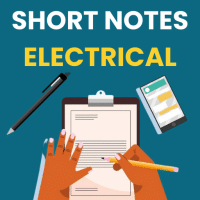Electrical Engineering (EE) Exam > Electrical Engineering (EE) Questions > At higher forward voltage, a junction diode i...
Start Learning for Free
At higher forward voltage, a junction diode is likely to –
- a)Become noisy
- b)Burn out
- c)Get saturated
- d)Suffer break down
Correct answer is option 'B'. Can you explain this answer?
Most Upvoted Answer
At higher forward voltage, a junction diode is likely to a)Become nois...
Introduction:
A junction diode is a two-terminal semiconductor device that allows current to flow in only one direction. It is formed by joining a p-type semiconductor with an n-type semiconductor, creating a junction between them. The behavior of a junction diode depends on the forward voltage applied across it.
Explanation:
When a forward voltage is applied to a junction diode, the majority carriers (electrons in the n-region and holes in the p-region) are pushed towards the junction. This movement of carriers allows current to flow through the diode. However, as the forward voltage increases, the diode may exhibit different behaviors.
Burn out:
At higher forward voltage, a junction diode is likely to burn out. This occurs when the forward voltage exceeds the maximum allowable voltage rating of the diode. The excessive voltage causes an excessive current to flow through the diode, leading to overheating and damaging the diode. This can result in the diode becoming permanently non-functional.
Other Options:
Let's briefly discuss the other options mentioned in the question and explain why they are not correct answers:
1. Noise: Noise in a diode is typically caused by fluctuations in current or voltage. While higher forward voltage can increase the noise level, it is not the most likely outcome and not a direct consequence of increasing forward voltage.
2. Saturation: Saturation refers to the condition when a diode allows maximum current to flow through it. It occurs when the diode is forward biased and the forward voltage is sufficient to overcome the potential barrier at the junction. However, saturation is not directly related to higher forward voltage.
3. Breakdown: Breakdown is a phenomenon that occurs when the reverse voltage across a diode exceeds its breakdown voltage. It leads to a sudden increase in reverse current. However, the question specifically asks about forward voltage, so breakdown is not the correct answer.
Conclusion:
At higher forward voltage, a junction diode is likely to burn out if the voltage exceeds its maximum allowable rating. This can result in permanent damage to the diode and render it non-functional. It is important to ensure that the forward voltage applied to a diode is within its specified limits to prevent burnout.
A junction diode is a two-terminal semiconductor device that allows current to flow in only one direction. It is formed by joining a p-type semiconductor with an n-type semiconductor, creating a junction between them. The behavior of a junction diode depends on the forward voltage applied across it.
Explanation:
When a forward voltage is applied to a junction diode, the majority carriers (electrons in the n-region and holes in the p-region) are pushed towards the junction. This movement of carriers allows current to flow through the diode. However, as the forward voltage increases, the diode may exhibit different behaviors.
Burn out:
At higher forward voltage, a junction diode is likely to burn out. This occurs when the forward voltage exceeds the maximum allowable voltage rating of the diode. The excessive voltage causes an excessive current to flow through the diode, leading to overheating and damaging the diode. This can result in the diode becoming permanently non-functional.
Other Options:
Let's briefly discuss the other options mentioned in the question and explain why they are not correct answers:
1. Noise: Noise in a diode is typically caused by fluctuations in current or voltage. While higher forward voltage can increase the noise level, it is not the most likely outcome and not a direct consequence of increasing forward voltage.
2. Saturation: Saturation refers to the condition when a diode allows maximum current to flow through it. It occurs when the diode is forward biased and the forward voltage is sufficient to overcome the potential barrier at the junction. However, saturation is not directly related to higher forward voltage.
3. Breakdown: Breakdown is a phenomenon that occurs when the reverse voltage across a diode exceeds its breakdown voltage. It leads to a sudden increase in reverse current. However, the question specifically asks about forward voltage, so breakdown is not the correct answer.
Conclusion:
At higher forward voltage, a junction diode is likely to burn out if the voltage exceeds its maximum allowable rating. This can result in permanent damage to the diode and render it non-functional. It is important to ensure that the forward voltage applied to a diode is within its specified limits to prevent burnout.

|
Explore Courses for Electrical Engineering (EE) exam
|

|
Question Description
At higher forward voltage, a junction diode is likely to a)Become noisyb)Burn outc)Get saturatedd)Suffer break downCorrect answer is option 'B'. Can you explain this answer? for Electrical Engineering (EE) 2025 is part of Electrical Engineering (EE) preparation. The Question and answers have been prepared according to the Electrical Engineering (EE) exam syllabus. Information about At higher forward voltage, a junction diode is likely to a)Become noisyb)Burn outc)Get saturatedd)Suffer break downCorrect answer is option 'B'. Can you explain this answer? covers all topics & solutions for Electrical Engineering (EE) 2025 Exam. Find important definitions, questions, meanings, examples, exercises and tests below for At higher forward voltage, a junction diode is likely to a)Become noisyb)Burn outc)Get saturatedd)Suffer break downCorrect answer is option 'B'. Can you explain this answer?.
At higher forward voltage, a junction diode is likely to a)Become noisyb)Burn outc)Get saturatedd)Suffer break downCorrect answer is option 'B'. Can you explain this answer? for Electrical Engineering (EE) 2025 is part of Electrical Engineering (EE) preparation. The Question and answers have been prepared according to the Electrical Engineering (EE) exam syllabus. Information about At higher forward voltage, a junction diode is likely to a)Become noisyb)Burn outc)Get saturatedd)Suffer break downCorrect answer is option 'B'. Can you explain this answer? covers all topics & solutions for Electrical Engineering (EE) 2025 Exam. Find important definitions, questions, meanings, examples, exercises and tests below for At higher forward voltage, a junction diode is likely to a)Become noisyb)Burn outc)Get saturatedd)Suffer break downCorrect answer is option 'B'. Can you explain this answer?.
Solutions for At higher forward voltage, a junction diode is likely to a)Become noisyb)Burn outc)Get saturatedd)Suffer break downCorrect answer is option 'B'. Can you explain this answer? in English & in Hindi are available as part of our courses for Electrical Engineering (EE).
Download more important topics, notes, lectures and mock test series for Electrical Engineering (EE) Exam by signing up for free.
Here you can find the meaning of At higher forward voltage, a junction diode is likely to a)Become noisyb)Burn outc)Get saturatedd)Suffer break downCorrect answer is option 'B'. Can you explain this answer? defined & explained in the simplest way possible. Besides giving the explanation of
At higher forward voltage, a junction diode is likely to a)Become noisyb)Burn outc)Get saturatedd)Suffer break downCorrect answer is option 'B'. Can you explain this answer?, a detailed solution for At higher forward voltage, a junction diode is likely to a)Become noisyb)Burn outc)Get saturatedd)Suffer break downCorrect answer is option 'B'. Can you explain this answer? has been provided alongside types of At higher forward voltage, a junction diode is likely to a)Become noisyb)Burn outc)Get saturatedd)Suffer break downCorrect answer is option 'B'. Can you explain this answer? theory, EduRev gives you an
ample number of questions to practice At higher forward voltage, a junction diode is likely to a)Become noisyb)Burn outc)Get saturatedd)Suffer break downCorrect answer is option 'B'. Can you explain this answer? tests, examples and also practice Electrical Engineering (EE) tests.

|
Explore Courses for Electrical Engineering (EE) exam
|

|
Signup for Free!
Signup to see your scores go up within 7 days! Learn & Practice with 1000+ FREE Notes, Videos & Tests.


















